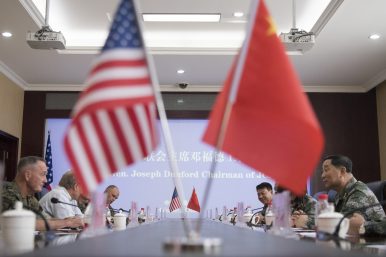By Xie Tao
 The Trump administration fired the first shot in the U.S.-China trade war. Thus one would expect most Chinese to view their government’s retaliatory measures as justified and to support those measures. Yet commentaries in Chinese mass media clearly indicate that Chinese elites are sharply divided over how to respond to Washington. At one end are those who ardently support tit-for-tat. Many assert that the economic warfare is an integral part of an emerging U.S. strategy to undermine the great rejuvenation of the Chinese nation. They point out that Washington increasingly perceives China as a serious threat to American supremacy and the U.S.-led liberal international order. They believe that any unilateral compromise will only lead to a slippery slope of harsher demands from Washington.
The Trump administration fired the first shot in the U.S.-China trade war. Thus one would expect most Chinese to view their government’s retaliatory measures as justified and to support those measures. Yet commentaries in Chinese mass media clearly indicate that Chinese elites are sharply divided over how to respond to Washington. At one end are those who ardently support tit-for-tat. Many assert that the economic warfare is an integral part of an emerging U.S. strategy to undermine the great rejuvenation of the Chinese nation. They point out that Washington increasingly perceives China as a serious threat to American supremacy and the U.S.-led liberal international order. They believe that any unilateral compromise will only lead to a slippery slope of harsher demands from Washington.
In their view, the Chinese dream of national rejuvenation is at the most critical juncture; to swallow the Trump administration’s conditions for averting punitive tariffs — or to pay those punitive tariffs without fighting back — is to sacrifice “making China great again” on Trump’s altar of “making America great again.”
Others rally behind the Chinese government because they believe that China will be the ultimate winner of the trade war. Their optimism is based on several factors. U.S. imports from China are so large (more than $400 billion in 2017) that it is simply impossible to find alternative suppliers of such a scale anytime soon. Plus, Chinese retaliatory measures have had significant adverse impacts on American farmers, whose support was crucial for Trump’s 2016 electoral win. Sooner or later, they predict, importers and farmers will force Washington to raise the white flag.
At the other end are those who have strong reservations about Chinese retaliation. Some of them contend that China will end up being the loser. Their pessimism also seems justified. A trade war will probably result in a significant decrease in exports, exacerbating the already ailing Chinese economy. Economic warfare may also wreak havoc on China’s financial market, triggering massive capital flight and sharp depreciation of the Chinese currency. America can better afford a trade war because its economy is registering stellar growth.
Many others subscribe to the view that external pressure is a powerful force for domestic reform. They believe that Beijing should have accepted Washington’s initial demands, including across-the-board tariff reduction, better market access for foreign companies, and reduced subsidies to state-owned enterprises. These measures, they claim, not only benefit the average Chinese but also foster sustainable growth. They assert that the best way to compete with America economically is to deepen economic reform at home, or China might win the battle but lose the war.
For the sake of convenience, those who support the trade war may be called nationalists, while those who have reservations about it liberalists. Nationalists tend to frame the trade war in the broad context of U.S.-China strategic rivalry, portraying America as the biggest threat to China’s national rejuvenation. Liberalists, by contrast, are inclined to view America not as a threat, but as a catalyst for China’s domestic reform and as an example to emulate. Both nationalists and liberalists want to make China great again, but their attitudes toward America cannot be more different.
The most recent controversy surrounding Hu Angang, a senior professor at Tsinghua University, amply illustrates the extent to which Chinese elites are polarized by America. The controversy grew out of an extensively reported claim that Hu made in a late 2017 speech: That China had already surpassed the United States in terms of economic power, technological power, and comprehensive power. Against the backdrop of the trade war, his claim was widely and vehemently criticized, on the grounds that it probably had misled Chinese decision-makers into believing that China is already powerful enough to afford a trade war with the United States.
Hu can be viewed as a member of the nationalists, who exude confidence about the inevitable decline of America and the unstoppable rise of China. His critics can be viewed as a sample of the liberalists, who see America’s supremacy largely unchallenged but China’s rise increasingly challenged at home and abroad.
In the final analysis, though, Chinese elites seem to be polarized not by America per se, but by what America means for the future of China. Nationalists tend to view America and China as representing two sets of distinctive political institutions and values that are utterly opposed to each other. For them, harmony (peace) in diversity (different regimes) between the two countries is hardly possible.
Liberalists see America as a country that is able and willing to help China achieve prosperity, democracy, and rule of law, all of which are included in the Socialist Core Values that have been espoused by the Chinese leadership. For them, America and China can have harmony.
To borrow from an American scholar, America’s polarization problem is unique, but America is not unique in having a polarization problem. On the other side of the Pacific Ocean, Chinese elites — and presumably a large segment of ordinary Chinese — are also polarized. Where this polarization will lead China is one of the most consequential unknowns for U.S.-China relations and for international peace and prosperity.
No comments:
Post a Comment